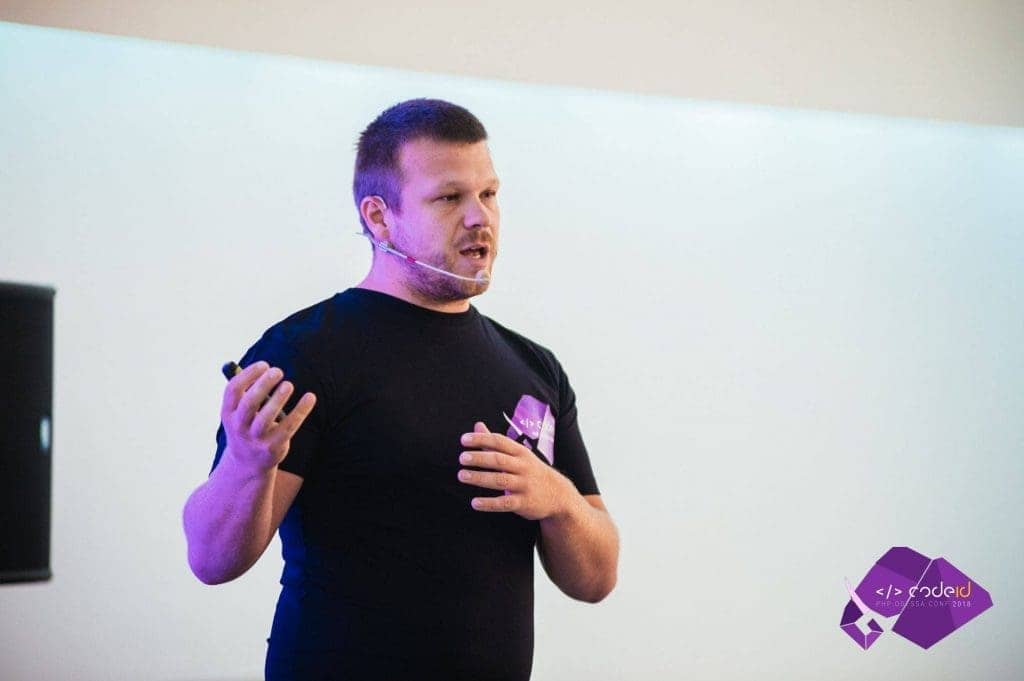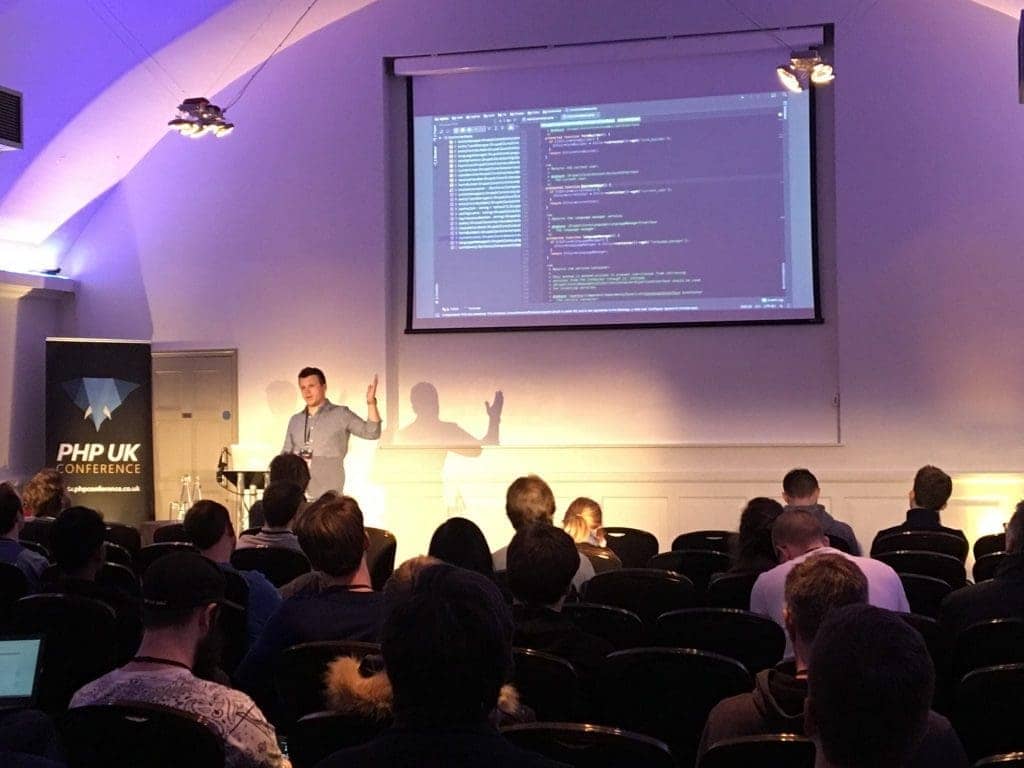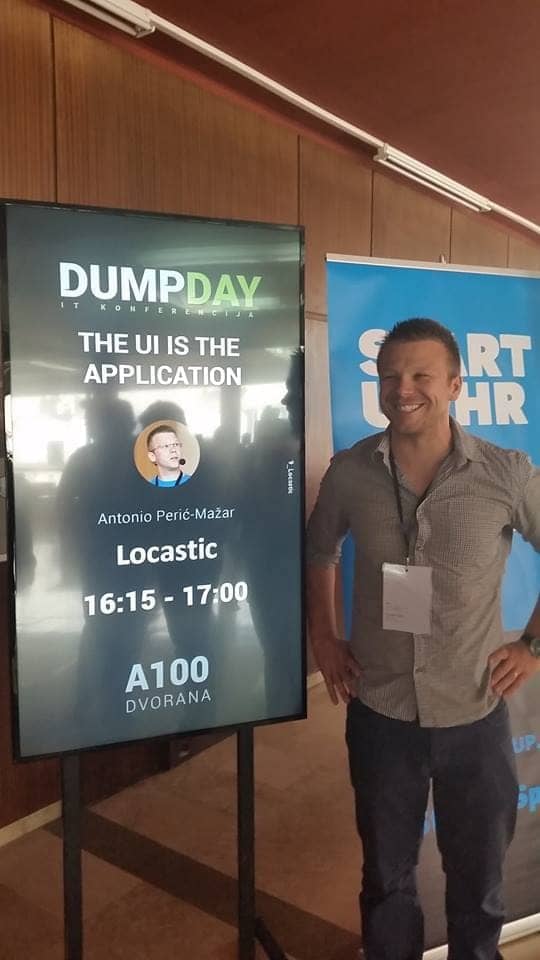Don’t be.
When you sum things up, public speaking is nothing more than a confidence trick. Even those people that you admire the most probably sucked in the beginning because no one is naturally good at their first public appearance.
I might be a really good example to talk about the confidence part since I had my fears upon entering the speaking world, and guess what – everything worked out well and I’ve done more than fifty events since then.

My speaking career kicked off back in early-2011. The first talk was featured at a local event in my hometown Split, which was a terrifying experience considering that I had to deliver my talk in front of people I actually knew. My palms were sweating, my voice shivered in the beginning, I feared the Q&A part, but once I got to understand the atmosphere and the audience, things started to get much easier.
Eventually, I survived the talk and all other things that followed, and the feeling of accomplishment forced me to do more in future. Not just as a personal goal, but as a company CEO, I always consider conferences to be a great media to showcase how we do things in
Since then, I spoke at more than 50 events all around Europe, and even one in Africa. During that period, I stumbled upon some basic questions and a few stereotypes about conferences and public speaking – so I decided to address them below. Let’s get it on!
“Public speaking is hard!”
It can be, but let’s change your perspective for a second. If you are getting ready to deliver a talk at some conference, that means that the first part is already behind you – the talk was submitted and accepted.
The second thing is that you know your topic and you know what are you talking about. Write down the whole flow of the talk, create the first version of your slides and do a dry run in front of a mirror, or even better – try to record yourself.
After a while, you will notice which parts of your talk are better and which ones are not so good. Focus on improving those less pleasant and in no time you will see how much improvement you did. We can even compare this with your technical skills, or your code – the first iteration is always the worst, but don’t despair, things do improve over time (over few iterations).
Don’t be scared. Everything is in your hands – you know the exact time and location of your talk, and there aren’t too many factors that can catch you off guard – analyze it, improve it, do the next iteration, track your time.
“How to start?”
Start small, use every opportunity to practice and eventually grow as a speaker. Every industry and almost every city in the world has a local initiative that actively works on growing the community. Some of them host meetups, others do workshops, but every and each one has the same goal – to spread the knowledge and to attract the community.
There’s your opportunity! Take some time to think and try to come across an idea on what you actually WANT to talk about, and then reach out to organizers. Be persistent, do that few times, get some confidence and start applying for events on a larger scale.
“What should I talk about?”
I keep hearing from people how they would love to try speaking bu they’re affraid they can’t find topic to talk about. Of course you can! There is for sure one thing that you are passionate about it in your work.

Everyone has a certain interest or a hobby that is worth talking about. It can be a project, it can be a situation that happened at work, it can be a new technology stack – whatever. Just make sure you talk about something you’re excited about and want to share it with other people. Pick yourself a topic that you are passionate about and you’ll do well. I guarantee it!
“What if something goes wrong?”
Well, public speaking is not easy for sure, and it is not same for all people. For some, it’s natural, but for others, it can be the hardest thing ever. Like, you need to go in front of really critical people and talk about a certain topic – there is a lot of
“If you can’t explain it to a six-year-old, you don’t understand it yourself.”
Albert Einstein
But if you think things through, you and only you are absolutely in control of the talk that you will deliver. You choose your own topic and hopefully, you’ll decide to talk about something in your area of expertise. The main premise is that people attend your talk because they want to learn something from you and once you grasp that – it’s an amazing feeling.
It’s simple – you know the exact time, location and all other factors that can help you prepare. Practice as much as you can, be innovative and create different scenarios and trust me – after the talk, a lot of people will approach you and start asking questions.
I see that post-event networking as the most important part of the cycle – always take notes and try to improve your talk for future iterations.
“Prepare, don’t improvise.”
Why not a mixture of both?
Improvisation is another great skill that you automatically improve if you start speaking on a regular base. There is no speaker in the world who hasn’t been in a situation where they were not 100% prepared and they simply had to do some improvisation.
To be honest, I think improvisation is an amazing skill and I definitely enjoy listening to speakers who do live on stage improvisation. Don’t get me wrong, seeing an unprepared speaker is the worst thing ever, but those people who get away with it are the most impressive ones as well.
So, the same way you learned to write a decent code, you can also invest the same amount of time in improving your speaking and communication skills. Your speaking life will be much more interesting once you see there is nothing to be scared of.
“Embrace the fear.”
According to quite a lot of studies, people’s number one fear is public speaking, and number two is death.
Death is number two. Does that seem right?
Well, that’s just how it is. Public speaking is not easy, just like with every other activity that includes emotions. It moves you out of your comfort zone, it can be stressful and it involves a lot of sentiment. And don’t forget that being fearless is not about eliminating the fear – it’s about mastering it!

It’s all about taking that fear and transforming it into excitement and energy around the message you are trying to display. If you focus on your talk in this way, you will feel amazing excitement and happiness right after delivering it.
But also, after some time you will probably feel very tired and exhausting. It’s because you put all your emotions in the talk itself. That is probably the best sign that you did a good job and put yourself completely in that adventure.
“It’s impossible to find a proper mentor.”
Public speaking is an active skill; recently we’ve seen schools and programs emerging around this trend. Some people have talent before they even start, but most of the speakers had to work their way up through dedication and practice.
Also, many conferences and communities (Symfony, for example) host initiatives to mentor new speakers for free. So, as a first-time speaker, or even as experienced one, you can get free training sessions on how to improve your talk. Amazing, isn’t it?
Yes it is, and that is the same community that is attending your talk – they are there to learn and to help you improve it in future.
There will be some situations when you will get average or bad reviews for your talk, but don’t allow this to have a bad effect on you. Read them, analyze your talk, write down mistakes and fix them for the next talk.
When I started my speaking career, I struggled with watching or listening to my own talks and I bet that most
Moreover, that is now actually the first thing I do after receiving recorded session/talk. And what I do is watch the recording, search for mistakes and later on try to improve for the next talk. I simply think that this kind of action is the most effective way to make gradual improvements.
Still not convinced? Maybe these few tips can help.

- Build your talks on top of your experience instead of basic how-to-start tutorials.
- Stand up when you practice – don’t sit or lay down.
- Don’t over-rehears, that can sound fake.
- Ask other community members to review your talk, most people will do it for free!
- Nail your intro to immediately showcase a sense of confidence.
- Always thank the organizers, they are the ones making things possible.
- Make yourself available to attendees after the talk is delivered.
- Take notes and implement your audience feedback for future talk iterations.
Public speaking will for sure force you to push your limits. First and the most important thing that you will need to learn and to get to know is how you act under stress and pressure. An example of an regular stress could be simple dysfunction of your mic or computer, and you’re in a front of 500 people.
That might have a huge effect on how you are handling stressful situations, not just in this industry – but on a daily basis too.
Stay calm!
I consider myself as an extroverted person who loves to meet new people and who loves spending time being surrounded by people. I know this is not a situation for most people (developers), but for introverted people, there is no better advice than just go out there and deliver THAT talk.
I personally learned that I experience a certain emotional pattern before each talk and I won’t lie to you – I still feel stressed as hell before heading over to a stage. However, as soon as I reach it, I forget about fears and my only focus becomes delivering the best possible talk ever.
That kind of experience reflected in my everyday life as well making me learn to control the situation better and to stay calm under the pressure of any kind.
Ultimately, don’t be scared to get out of your comfort zone.
This last advice applies for a bit later when your speaking eventually kicks off. Once they succeed and start delivering more and more talks, some people are struggling to get out of their area of expertise.
That’s just a fact – individuals tend to remain in within comfort zone because it prevents them from having to engage in new activities that they might find scary or intimidating.
Most of my talks were technical talks, but in future, I want to focus more on team management and business talks. My humble opinion is that we as an industry are outstanding at writing solid and sustainable code, but we suck in managing projects and people. I think I can contribute a lot in fixing this.
Did you already delivered your first talk or you are planning to do that?














